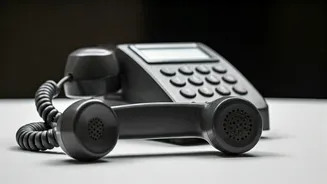The Anxiety Trigger
For some, the simple sound of a ringing phone can trigger feelings of intense anxiety. This reaction, which some people experience, may manifest as racing
heart, rapid breathing, and a sense of panic. The anxiety can be so severe that it negatively impacts daily life, causing people to avoid answering their phones or even turning them off entirely. The underlying reasons for this response are multifaceted, influenced by a blend of psychological and environmental factors. It's essential to recognize that this is a widespread phenomenon and that seeking comprehension and assistance is completely acceptable.
Social Pressure Concerns
One important factor is the social pressure associated with phone calls. When a phone rings, it demands an immediate response, often without prior warning or preparation. This abruptness may make some individuals feel pressured to react quickly, causing them to believe they have to sound informed, composed, and pleasant. This pressure might be intensified in social contexts where positive impressions are highly valued, which leads to self-consciousness and anxiety. The fear of making mistakes, saying the wrong things, or being judged negatively can then worsen the feeling, leading to a heightened state of anxiety, a phenomenon that's especially common for those who suffer from social anxiety.
Past Negative Experiences
Past negative encounters also contribute significantly to phone call anxiety. If individuals have had unpleasant or traumatic experiences linked to phone calls, their brains may have developed a negative association. This may have included receiving upsetting news, having confrontational conversations, or encountering unwanted calls. Such incidents can trigger the amygdala, a brain region that processes emotions and, in turn, activate a threat response every time the phone rings. As a result, a previously innocuous sound is transformed into a signal of potential threat, causing feelings of anxiety and unease. Understanding how prior interactions impact present responses is crucial for effectively managing this problem.
Control and Predictability
The feeling of being in charge and predicting an upcoming event influences anxiety levels. Phone calls, in contrast to other forms of communication such as texting or email, typically lack this predictability. Individuals may feel a loss of control because they don't know who is calling, why, or what will be discussed. This unpredictability can be particularly unsettling for individuals who prefer structure and certainty in their lives. It causes the brain to enter a state of heightened alertness, searching for threats and anticipating unfavorable scenarios. Managing this sense of a loss of control is an important step in decreasing phone call-related anxiety.
Practical Coping Strategies
Fortunately, there are several strategies to cope with phone call anxiety. One effective method is gradual exposure, which includes progressively exposing oneself to phone calls in a controlled setting. Starting with less stressful calls, like those from a friend, and gradually increasing the difficulty level can help decrease the fear. Mindfulness exercises, such as deep breathing and meditation, can help calm the mind and body before answering a phone call. Furthermore, cognitive restructuring, a method in which negative thoughts are challenged and reframed, may assist to alter how one perceives phone calls. If anxiety is severe, seeking support from a mental health professional can provide tailored strategies and promote overall well-being.














